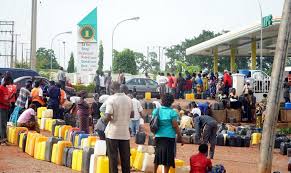By Milcah Tanimu
The ongoing petrol scarcity in Nigeria has escalated in recent weeks, spreading across various states and causing significant disruptions to daily life and economic activities. Despite assurances from the Nigerian National Petroleum Company Limited (NPCL) regarding adequate stock, the Independent Petroleum Marketers Association of Nigeria (IPMAN) predicts that it will take at least two more weeks to normalize the situation. Several factors contribute to this crisis, including importation bottlenecks, licensing delays for marketers, and logistical challenges.
According to IPMAN’s Public Relations Officer, Chinedu Ukadike, the scarcity stems from a combination of international supply chain disruptions and domestic licensing issues. The closure of filling stations and long queues at those still operational reflect the severity of the situation, with some stations selling petrol at exorbitant prices. The shortage has also led to increased fares for transportation, further burdening commuters and businesses.
Efforts to address the crisis include ongoing discussions between stakeholders and appeals for regulatory intervention. Marketers are urging the NNPC to extend the deadline for license renewal and expedite the licensing process to ease supply constraints. However, challenges persist, with many motorists resorting to the black market, where petrol prices have soared to unprecedented levels.
The impact of the scarcity extends beyond inconvenience, affecting businesses, transportation, and overall economic productivity. Transport operators report significant declines in patronage and revenue, with some considering fare reductions to stimulate demand. This downturn in travel and commerce exacerbates existing economic challenges, highlighting the urgency of resolving the fuel shortage.
As the situation unfolds, stakeholders emphasize the need for swift action and effective coordination among regulatory agencies, marketers, and government bodies. Addressing underlying issues such as licensing delays and supply chain disruptions is crucial to restoring stability and ensuring the uninterrupted availability of petrol nationwide. Until then, Nigerians brace themselves for continued uncertainty and disruptions caused by the protracted fuel crisis.

